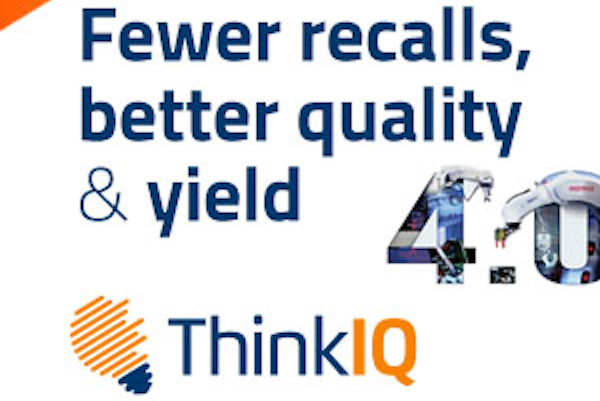
Industry 4.0 and Smart Manufacturing: There’s a lot of buzz today, and yet there can still be a lot of confusion about what they are and how they apply in manufacturing.
Let’s explore some of the real world ways the digital solutions of Industry 4.0 Smart Manufacturing are changing the game for manufacturers.
Industry 4.0 In Action
The first thing to know is that Industry 4.0, aka the Fourth Industrial Revolution, is changing the manufacturing landscape through a digital transformation driven by continuous intelligence, automation, and connectivity in a cyber-physical environment.
The next thing to understand is how this applies in actuality for your business.
Manufacturing firms today generate massive amounts of data. The Industry 4.0 digital transformation involves the contextualization of that data to provide critical insights into the manufacturing process and supply chain. The ability to have a complete end-to-end overview of operations is revolutionary (hence the title “Fourth Industrial Revolution”).
Here are 5 examples that demonstrate Industry 4.0 Smart Manufacturing in action:
- Finding the Problem Component - Industry 4.0 technologies such as artificial intelligence (AI) and machine learning (ML) can deliver advanced visualizations of your manufacturing line, with cause-and-effect analysis of upstream events that helps to optimize downstream activities. So, if part of the assembly line slows down in the Mining Industry, for example, causing a sensitive raw material to overheat, realtime data analytics can alert you to the problem so you can make the necessary adjustments before it becomes a larger issue.
- Increasing the Yield of a Product - Even small changes can be of massive consequence to manufacturing productivity; advanced data analytics can spot opportunities for improvement. Continuous intelligence in conjunction with industrial internet of things (IIoT) sensors can detect the exact size at which a product is cut, for instance, allowing you to see how modifications for precision would optimize consistency and yield, while reducing waste.
- Preventing a Potential Recall - In the Pharmaceutical Industry, regulations are understandably stringent. The ability to trace products from raw materials through to patient delivery is crucial when it comes to ensuring the utmost in product safety, at any time, but especially in the middle of a pandemic. With Smart Manufacturing technology, material traceability and attribute tracking can identify anomalies to produce safer products and minimize recall events, resulting in minimum impact to your customers and to your business’ bottom line.
- Optimizing Supply Chains - With an integrated and connected supply chain, adjustments can be made as new realtime data is gathered and analyzed. Let’s say a weather event causes a shipment delay, or a truck breaks down somewhere along the line—a connected Smart Manufacturing system can make proactive adjustments with prescriptive analytics, modifying manufacturing priorities to not only minimize impact, but actually increase supply chain agility in preparation for future challenges.
- Improving Plant and Worker Safety - Advanced Industry 4.0 technologies can monitor Key Performance Indicators (KPI) of safety. Production and equipment can be tracked and controlled using realtime data that detects temperature, humidity, the presence of gasses, radiation, etc., and ML allows for machines to predict when maintenance is needed, reducing workplace incidents, and ensuring a safer, more secure manufacturing environment and operation.
Understanding how Industry 4.0 technologies are harnessed to drive Smart Manufacturing enterprises is key for manufacturers to stay on the cutting edge of the digital transformation that is sweeping across the manufacturing world now, and into the future.
Making Moves With Smart Manufacturing
Even smarter than understanding how Smart Manufacturing works in the real world is putting it into action for your own manufacturing enterprise. That’s where ThinkIQ comes in. ThinkIQ supplies Transformational Intelligence, taking manufacturing businesses through the 5 stages needed to reach fully automated Smart Manufacturing status. Each stage offers valuable improvements to manufacturers, combining the best of supply train traceability and predictive and prescriptive analytics into the next generation manufacturing data platform.
ThinkIQ’s Transformational Intelligence platform contextualizes data — both in-plant and across your supply chain—going far beyond analytics to reveal how every element of your supply and manufacturing chain may impact the final product, allowing you to intelligently transform your process.
Companies that are embracing the digital transformation of Industry 4.0 are opening themselves up to a multitude of benefits, from greater supply chain agility, to increased productivity, to maximized overall operational performance. Manufacturing has evolved, and the time is now for manufacturers to evolve along with it on a path toward modern, optimized Smart Manufacturing.
Make Industry 4.0 Smart Manufacturing technologies work for you to get real world results - get in touch with a ThinkIQ expert today to learn more about how ThinkIQ Manufacturing Digital Transformation SaaS delivers the Smart Manufacturing tools you need to compete in Industry 4.0, or you can download our new eBook titled "Advanced Material Traceability Revolutionizes Digital Transformation"


